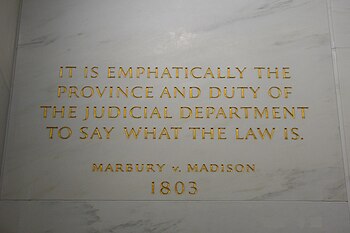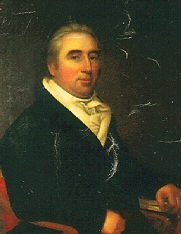
A number of news articles have appeared about how former Speaker of the House and current presidential candidate Newt Gingrich is claiming that he would ignore the court rulings that he doesn’t like. Nobody is above the law, but who gets to decide what the law is, and how it applies? According to Mr. Gingrich, he is. He wrote, “Should the Supreme Court issue decisions during a Gingrich administration that unconstitutionally empower federal judges with certain national security responsibilities, such decisions will be ignored”. Mr. Gingrich contradicts law that is literally written in stone.

In 1803, on his way out of town, President John Adams and his party attempted to fill a number of key appointments. One of those was that of the Justice of the Peace for the District of Columbia. Having been nominated by the President and confirmed by the Senate, William Marbury needed only receive his commission of office from the Secretary of State. He never got it, because his was one of a number of last minute commissions, and there simply wasn’t enough time to deliver it before Adams and his Secretary of State left office. When Thomas Jefferson took office as President, and he appointed James Madison as the new Secretary of State. When Marbury came calling for his commission of office, Madison refused to give it to him. Marbury sued, requesting what is known as a Writ of Mandamus to compel the Secretary of State to disgorge the commission, as provided by the Judiciary Act of 1789.
In a fascinating opinion, the Supreme Court of the United States said that they did not have the power to force Madison issue the writ. By articulating what power the Court didn’t have, John Marshall‘s opinion of the Court in effect voided a portion of the act, and for the first time established that not only is the Constitution the highest law of the land, but that the Supreme Court is the final interpreter of the Constitution. Since the President’s power is defined in the Constitution, it therefore holds that the Supreme Court is the final arbiter of the President’s powers, as well. Prior to that, while some may have thought that this was so, in fact it hadn’t been decided.
In the truest sense of the words, Marbury v. Madison is stare decisis, or settled law. But every so many decades, even settled law can become unsettled. This has happened when social norms have changed, or more likely when interpretation of the Constitution has changed. But the change has always come from the Supreme Court itself, and not from Congress and the States, and never from the President.
 According to the Wall Street Journal‘s article, Mr. Gingrich proposes a mechanism by which the other two branches of government could override the Supreme Court. That’s dangerous.
According to the Wall Street Journal‘s article, Mr. Gingrich proposes a mechanism by which the other two branches of government could override the Supreme Court. That’s dangerous.
Contrary to Gingrich’s assertions, a reckless Court was the last thing on the founders’ minds. Through Article 3 Section 2 of the Constitution, Congress can limit the jurisdiction of the Supreme Court. The States through their legislatures have the power to amend the Constitution. The President has no role in either interpreting the Constitution or changing it. This was no accident, as the founders had just fought a war against a king.
This is not to say that the President has no influence. Although the Court is substantially insulated from day to day politics, the justices themselves take into account circumstances, as was clear in Korematsu v. United States. In that case where the justices bent their will to the times, the results can only be said to be tragic. Interestingly, it seems that the U.S. Patriot Act has not yet been tested by the Supreme Court. What separates America from dictatorship is our rule of law. Let that test happen at some point, and let’s not have another king overrule the Court.